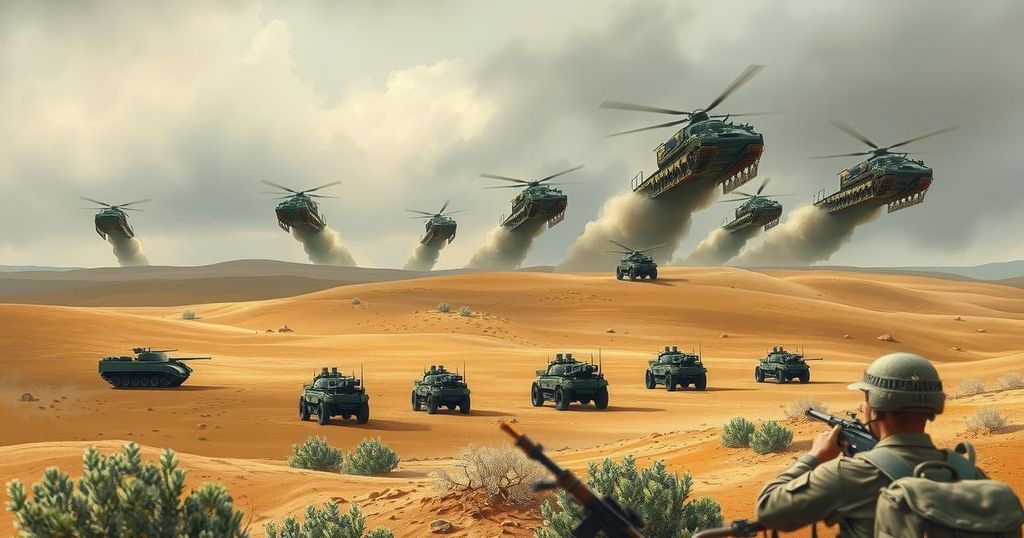North Korean Troops Deployed by Russia in Kursk: Concerns Rise Over Combat Integration

Ukrainian President Zelensky has reported significant deployment of North Korean soldiers in the Kursk region, indicating their integration into operations with Russian forces. Intelligence suggests their combat involvement could be imminent, with some troops having been prepared and moved covertly to the front lines. The situation raises concerns about combat effectiveness and morale, as Ukrainian servicemen report prior engagements by North Koreans with noted challenges. This evolving dynamic poses significant questions regarding the conflict’s trajectory.
In a significant development, Ukrainian President Volodymyr Zelensky has reported that Russia has deployed a notable number of North Korean soldiers to the Kursk area for military operations. During his evening address on December 14, he indicated that these troops have been integrated into joint units alongside Russian forces. This potential for expansion of their presence raises concerns, as initial intelligence hints at their use on other fronts, beyond just Kursk.
Zelensky’s remarks come on the heels of updates from Ukraine’s Main Intelligence Directorate (HUR), which announced on Telegram that North Korean troops are preparing to attack Ukrainian positions imminently. The HUR noted that these North Korean soldiers, given orders from their command in Russia, are currently cooperating with Russian military units in that region, suggesting a quick escalation in their combat role.
Additionally, information from HUR indicated that North Korean forces recently received enhanced food supplies and were put on high alert, reportedly being covertly moved to the front lines under the guise of civilian trucks. Andrey Kovalenko, head of the Center for Countering Disinformation, remarked on Telegram that while North Korean fighters are involved in operations, there is no need to overstate their capabilities—”they end, like everyone else.”
Meanwhile, some Ukrainian soldiers assert that North Korean troops have been engaging in combat since earlier weeks. Stanislav Bunyatov, a sergeant in the 24th Aidar Assault Battalion, shared his observations on Telegram, describing North Korean soldiers as well-trained and knowledgeable about Soviet weaponry. However, he warned that their morale might falter when faced with heavy casualties, particularly for comrades with whom they have served loyally for years.
Bunyatov further elaborated on the tactical disadvantages faced by North Korean troops, noting that Russian commanders seem unaware of their limitations when sending them into dangerous assaults. He stated, “They will die just like our ‘brothers’ (Russians).” His commentary sheds light on the Kremlin’s likely motivation to portray enhanced troop numbers as victories derived from North Korean involvement, potentially to recruit more personnel for the front lines.
On December 10, U.S. Deputy Spokesperson Sabrina Singh confirmed that North Korean soldiers were in the Kursk region, poised for combat, but reiterated that they had not been observed directly engaging in offensive actions as of yet. President Zelensky expressed his dismay over Russia’s involvement of another state in its ongoing offensive, condemning the Kremlin for disregarding international calls for de-escalation and emphasizing Ukraine’s resolve to defend against all aggressors, including North Korean troops.
Recent reports suggest that approximately 2,000 North Korean soldiers have actively joined Russian military ranks, while an additional 9,000 remain in reserves, indicating a substantial commitment. According to HUR, these troops are under the command of three North Korean generals and are primarily kept in closed camps for training as they await deployment.
As tensions persist, it becomes evident that the involvement of North Korean troops may have broader implications, not just for Ukraine but for geopolitical stability in the region. The integration of these forces into Russian operations raises critical questions about the evolving dynamics of the conflict, suggesting that Moscow is willing to enlist international partners to prolong its military campaigns.
In summary, President Zelensky’s announcement about the deployment of North Korean troops in the Kursk region reveals a concerning collaboration between Russia and North Korea in the ongoing conflict against Ukraine. As intelligence indicates that these soldiers may soon join combat operations, the situation is becoming increasingly complex. The narratives from Ukrainian soldiers regarding these troops hint at considerable moral and tactical challenges. Consequently, this development not only escalates the current military engagement but also brings into question the wider implications for regional security.
Original Source: www.kyivpost.com








